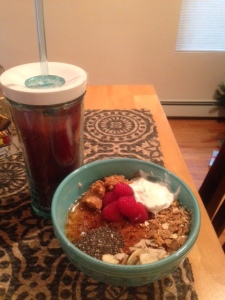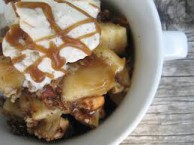I made this meal today for brunch. It may look small but it’s definitely keeps you full with all of its healthy ingredients. Although I should’ve practiced portion control a little better, I just couldn’t help but keep added more! Keep in mind this is already a high calorie meal, and although the calories come from good sources, you always want to avoid over eating. You get so many benefits out of this meal and it really sets you up to continue your day with enough energy while helping to keep you feel good throughout the day!
Sunset Blend Juice (See recipes tab)
Bowl of Oatmeal: 1/4 cup oats, 1/2 cup water, raspberries, cinnamon, honey, greek yogurt, chia seeds, natural peanut butter, almonds, apple muesli cereal
 The chia seeds give you antioxidants, fiber, and protein, it helps make up for the fiber lost in the juice. While the peanuts in the natural peanut butter are another source of protein, they also provide monounsaturated fats which help in lowering LDL cholesterol to keep cholesterol out of the blood. The greek yogurt helps promote a healthy gut due to the probiotics. Cinnamon has many different benefits ranging from helping with muscle spasms, preventing Alzheimer’s, help reduce blood sugar, and helps prevent the negative effects of a high fat meal. Almonds provide Vitamin E, magnesium and protein, as well as unsaturated fatty acids and fiber, they have been shown to be helpful in preventing cardiovascular heart disease. The raspberries are rich in vitamins, specifically Vitamins C, K and E, folate, iron, potassium, and manganese. They also contain a variety of the B vitamins and different antioxidants. Last but not least, the oats are full of soluble fiber and many other nutrients, as a valuable whole grain, they have been shown to help prevent heart failure, prevent formation of free-radicals, provide cardiovascular benefits, enhance immune response, lower risk of type 2 diabetes, and many other things. Overall this is a healthy meal, but like I said before, make sure to keep your servings smaller since there are a lot of ingredients and the calories add up fast! Enjoy!
The chia seeds give you antioxidants, fiber, and protein, it helps make up for the fiber lost in the juice. While the peanuts in the natural peanut butter are another source of protein, they also provide monounsaturated fats which help in lowering LDL cholesterol to keep cholesterol out of the blood. The greek yogurt helps promote a healthy gut due to the probiotics. Cinnamon has many different benefits ranging from helping with muscle spasms, preventing Alzheimer’s, help reduce blood sugar, and helps prevent the negative effects of a high fat meal. Almonds provide Vitamin E, magnesium and protein, as well as unsaturated fatty acids and fiber, they have been shown to be helpful in preventing cardiovascular heart disease. The raspberries are rich in vitamins, specifically Vitamins C, K and E, folate, iron, potassium, and manganese. They also contain a variety of the B vitamins and different antioxidants. Last but not least, the oats are full of soluble fiber and many other nutrients, as a valuable whole grain, they have been shown to help prevent heart failure, prevent formation of free-radicals, provide cardiovascular benefits, enhance immune response, lower risk of type 2 diabetes, and many other things. Overall this is a healthy meal, but like I said before, make sure to keep your servings smaller since there are a lot of ingredients and the calories add up fast! Enjoy!



